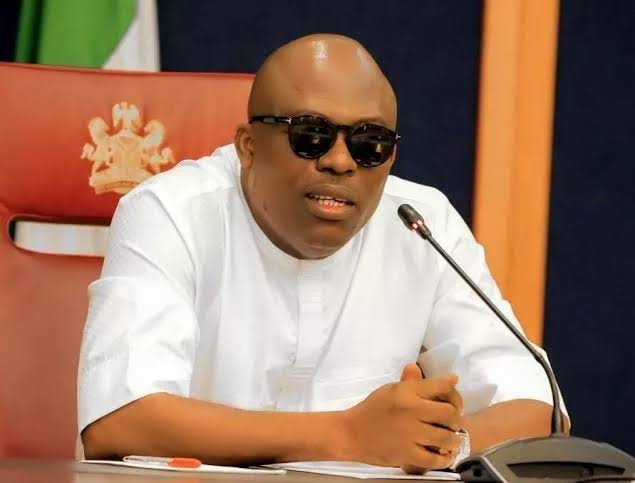Democracy Day: Good Governance Situation Room Names Govs Bago, Fubara as Most Outstanding, Best Performing Governors in Nigeria
A coalition of 100 Pro-Democracy Groups in Nigeria under the auspices of Good Governance Situation Room has announced that Governors Mohammed Umar Bago of Niger State and Siminalayi Fubara of Rivers State are to receive a joint award for “Best Performing Governor of the Year”.
This was contained in a statement signed by the National Coordinator of the coalition, Comrade Isaac Ikpa, and issued to journalists on Friday in Abuja.
Ikpa noted that the coalition selected Governors Bago and Fubara for the award after assessing the achievements of all the governors sworn in on May 29, 2023, in their first year in office.
He added that the data for the final awards was collected through various reliable means, including the internet and physical assessments of what is on the ground in all the states.
“After assessing what was achieved by all the governors sworn in on May 29, 2023, in the first year of their stewardship, the Good Governance Situation Room, a coalition of 100 reputable Pro-Democracy Groups based in Nigeria, has named Governors Mohammed Umar Bago of Niger State and Siminalayi Fubara of Rivers State, as the Best Performing Governors in Nigeria,” the statement said.
“We carefully reviewed the performances of the governors in areas such as education, health, agriculture, security, economy, infrastructural development, human capital development and social justice using data collected via the Internet and physical assessment of what is on ground in all the states. After analysing the available data, Governors Bago and Fubara emerged as the most outstanding in terms of development and provision of good governance in the country.
“Governor Mohammed Umar Bago of Niger State has established a reputation for integrity and transparency, and his achievements in his first year in office are commendable. He prioritizes peace as a necessary elixir for the development of society and distributed over 20 operational vehicles to the Niger State Command of Nigeria Police, its sister agencies like the SSS, NSCDC, NDLEA, and some other non-conventional security agencies to curb crime in the state. He also provided a new Divisional Police Headquarters in Chanchaga, replacing the old structure which was built on a water pipeline over 30 years ago, thereby denying hundreds of residents water supply.
“In terms of infrastructural development, Governor Bago rehabilitated a failed section of Minna-Bida road, and signed a contract agreement with BENIJ Nigeria Limited for the construction of 556 km of roads earmarked across the state.
“In agriculture, the Governor procured and distributed thousands of bags of fertilizer and other farm inputs to farmers in the state for the wet season at a subsidized price. He even dropped the ‘His Excellency’ title for ‘Farmer Governor,’ which he said was to reinforce the priority of his administration on agriculture.
“In the health sector, Governor Bago’s administration is currently redesigning the moribund Shiroro Hotel into Ibrahim Badamasi Babangida University Teaching Hospital, which is a display of purposeful, resourceful, and progressive leadership in action.
“In addition to the renovation of schools, award of scholarships to indigene students, sponsorship of huge number of citizens for pilgrimage in Saudi Arabia, provision of solar street lighting systems and motorised boreholes, the governor distributed food items worth N3bn across the 25 local government areas of the state as a palliative to cushion the effect of petroleum subsidy removal on citizens. He also approved the payment of wage award of N20,000 for every civil servants in the state following President Bola Tinubu’s appeal to state governments to implement the payment of the wage award to help cushion the economic challenges faced by the people.
“When Rivers State Governor, Sim Fubara came into office, he had promised a minimum of 16 projects in his 100 days, a promise he has kept considering what had been put on ground already. The Governor has completed over 21 road projects totalling about 68km across several local government areas of the state in less than one year in office. The Port Harcourt Ring Road project, which his administration flagged off on 17 July 2023, is the largest infrastructure project by a State Government in Nigeria. The 50.15 km dual-carriageway ring road, when completed, will connect and enhance economic progress and integration across at least six local government areas and open a vast gateway for new local and foreign investments in real estate, agriculture, hospitality, and industrial ventures within the state.
“In a bid to stimulate economic growth, enhance job creation, and reduce poverty, Governor Fubara has created a four-billion-naira Enterprise Fund in partnership with the Bank of Industry to facilitate the development of micro, small, and medium enterprises (MSMEs) in the State. The Governor also initiated several other projects and programs, including the Rivers State Youth Empowerment Scheme, the Rivers State Strategic Development Plan, and the Rivers State Health Insurance Scheme.
“Governor Fubara also scored high in other sectors like education, health, as seen in the numbers of schools and hospitals renovated and numerous ongoing projects in the state. In addition, the governor provided some buses as palliatives to ease the transportation difficulties facing Rivers residents as a result of the hike in fuel price. The buses ferry commuters from one station to another free of charge. Some ply the local government areas, while others ply the streets of Port Harcourt.
“These and many more are the solid achievements of the two Governors selected to be the joint winner of the ‘Best Performing Governor of the Year’ award. Their achievements in less than one year were considered to be far-reaching and worthy of emulation,” the statement added.







 Business7 months ago
Business7 months ago
 celebrity radar - gossips5 months ago
celebrity radar - gossips5 months ago
 celebrity radar - gossips4 months ago
celebrity radar - gossips4 months ago
 Business3 months ago
Business3 months ago










